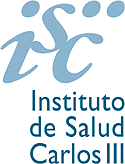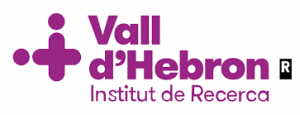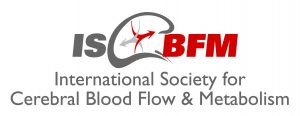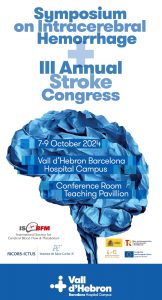III Congreso Anual de Ictus
7-9 de octubre de 2024, Barcelona
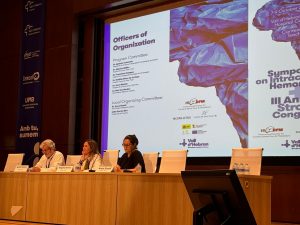
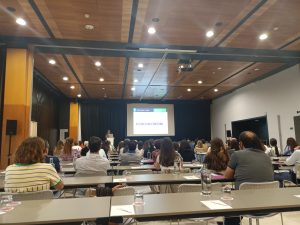
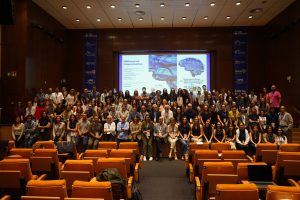
Del 7 al 9 de octubre de 2025 celebramos el III Congreso Anual de Ictus en el Hospital Universitario Vall d´Hebrón de Barcelona con las asistencia de 161 personas.
El congreso constó de dos partes; los días 7 y 8 de octubre: New insights and perspectives on intracerebral hemorrhage, y el día 9 de octubre: Ischemic stroke meeting. Spanish Stroke Research Network.
A continuación se detalla el programa con las presentaciones de las que pudimos disfrutar:
NEW INSIGHTS AND PERSPECTIVES ON INTRACEREBRAL HEMORRHAGE: A COMPREHENSIVE UPDATE
7 de octubre:
18:30 – State of the art in intracerebral hemorrhage management and impact on global health, Nikola Sprigg
8 de octubre:
8:45 a.m. Welcome and Opening Remark Ignacio Lizasoain
Begoña Benito Villabriga, Directora Institut de Recerca Vall d´Hebron
Session I-NOT ALL BLEEDINGS ARE EQUAL
9:00 – Is it important to correctly classify ICH? Joan Martí Fàbregas,
9:25 – Animal models of hemorrhage: challenges and successes. Cyrille Orset
9:50 – Emerging concepts in sporadic cerebral amyloid angiopathy. Francisco Hernández
10:15 – Abstract presentation
- Clinical Implications of the combination of etiologies in patients with ICH. Daniel Vázquez
- The presence of circulating human apolipoprotein J reduces the occurrence of cerebral microbleeds in a transgenic mouse model with cerebral amyloid angiopathy. Mar Hernández
- Towards novel intracerebral haemorrhage stroke models by endovascular approach in swine 11. Teresa GasulL
- Study of MFG-E8 in experimental models of Cerebral Amyloid Angiopathy. Berta Páez
11:00 – Coffee Break
SESION II-TACKLING THE CONSEQUENCES OF INTRACEREBRAL HEMORRHAGE
11:30 – “Time is brain” also in hemorrhage [Hematoma expansion, care bundle, blood pressure reduction, hemostatic agents, neurosurgical treatment options, minimally invasive surgery]. David Rodríguez-Luna
11:55 – Novel targets and treatments for brain hemorrhage [Biological mechanisms associated peri-hematoma edema and brain injury, neuroprotective and neurorestoring agents]. Marietta Zille
12:20 – Antithrombotic treatment after ICH: harmful or beneficial? Rustam Al-Shahi Salman
12:45 – Abstract presentation
- Association between cerebral hemorrhage volume and acute hydrocephalus in aneurysmal subarachnoid hemorrhage: a semiautomatic measurement study. Laura Amaya
- Iron-free transferrin (apotransferrin) as a new treatment to improve stroke outcome in intracerebral hemorrhage. Teresa Gasull
- The proteome of Circulating Extracellular Vesicles as biomarkers of damage and repair in Intracerebral Hemorrhage. An approach to novel therapies? María Alonso de Leciñana
- Bacterial translocation after hemorrhagic stroke. Effect of the hematoma size and the absence of TLR4. Nuria Alfageme
13:30 – Lunch
SESSION III-WHAT BIOMARKERS BRING US
15:00 – Biological biomarkers: state of the art and usefulness, Mira Katan
15:25 – What is written in the genes. Jordi Jiménez
15:50 – Imaging biomarkers: what to look out for. Andrea Morotti
16:15 – Abstract presentation
- New Biomarkers in Predicting Intracerebral Hemorrhage Expansion: Cell-Free DNA. Levels and Noncontrast Computed Tomography Markers. Carla Vera
- A highly specific blood biomarkers panel to identify intracerebral hemorrhage at the ambulance might help to start pre-hospital blood-pressure reduction. Joan Montaner
- Multimodal imaging evaluation of the inflammatory response following experimental subarachnoid haemorrhage. Maider Garbizu
- Circulating mirnas as potential biomarkers of haematoma growth in intracerebral haemorrhage: a pilot study. María Lucas
17:00 – Coffee break
SESSION IV-FUTURE OF ICH
17:30 – How to manage uncertainty in decision making: prognostic models in ICH [Ethical issues in decision making, prognostic scales, predictive models, use of Artificial Intelligence]. Valeria Caso
17:55 – Update on ongoing clinical trials. Yolanda Silva
18:20 – Abstract presentation
- Circadian variation in clinical outcomes of intracerebral haemorrhage: the relevance of location. A retrospective study. María Esther Llorente
- Prognosis of Lobar Intracerebral Haemorrhage in Relation to Circulating Omega-3 Fatty Acids at Admission. Tomàs Xuclá
- p53 is involved in vascular damage and repair after hemorrhagic stroke. Cristina Rodriguez
19:05 – Closing Remarks, Mònica Millán, Hospital Germans Trias i Pujol (Spain)
19:15 – Final
SPANISH STROKE RESEARCH NETWORK MEETING
9 de octubre:
08:30 – 08:45: Welcome and Opening Remarks. Ignacio Lizasoain
08:45 – 09:05: 2022 Seed Fund: “Study of the role of RhoA and XDH proteins in mid intracerebral haemorrhage through the development of an in vitro model”. María Gutierrez
09:05 – 09:25: 2023 Seed Fund: “Neuromodulation of executive dysfunction by transcranial direct current stimulation in a rat model of cerebral infarction”. Patricia Martinez
09:25 – 09:45: 2024 Seed Fund: “Effect of TLR4-mediated modulation of inflammation on the reduction of brain damage after paediatric ischaemic stroke”. Macarena Hernández
09:45 – 10:05: RESEARCH LINE 1. BIOMARKERS. Summary of the main results of the “collaborative projects” Anna Rosell, Joan Montaner
10:05 – 10:35: Coffee break
10:35 – 10:55: RESEARCH LINE 2. ACUTE-PHASE TREATMENT. Summary of the main results of the “collaborative projects” Joan Martí, Natalia Pérez de Ossa,
10:55 – 11:15: RESEARCH LINE 3. CEREBROPOTECTION. Summary of the main results of the “collaborative projects” Angeles Almeida, Francisco Campos
11:15 – 11:35: RESEARCH LINE 4. BRAIN REPAIR AND FUNCTIONAL RECOVERY.. Summary of the main results of the “collaborative projects” Exuperio Diez-Tejedor, Mar Freijó
11:35 – 11:55: RESEARCH LINE 5. SECONDARY PREVENTION. Summary of the main results of the “collaborative projects” Mar Castellanos, Tomás Segura
11:55 – 12:30: DISCUSSION AND QUESTIONS
12:30 – 13:00: Closing Remarks and General Assembly
13:00 – 14:30: Lunch
II Congreso Anual de Ictus
23 y 24 de marzo de 2023, Madrid
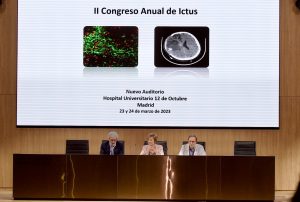
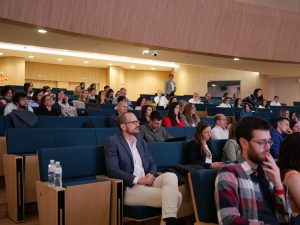
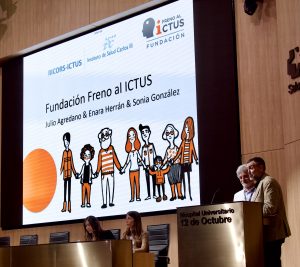
Los días 23 y 24 de marzo celebramos el l II Congreso Anual de Ictus en el Nuevo Auditorio del Hospital Universitario 12 de Octubre de Madrid con la asistencia de 148 personas.
A continuación se detalla el programa con las presentaciones de las que pudimos disfrutar:
Jueves 23 de Marzo 2023
10:30-11:00
Presentación de las Jornadas
Dr. Cristóbal Belda. Director. Instituto Salud Carlos III (ISCIII).
Dra. Rosario Perona. Subdirectora general Evaluación y Fomento Investigación
Dra. Carmen Martínez de Pancorbo. Directora Gerente Hospital 12 de Octubre
Dr. Joaquín Arenas. Director científico imas12
Dra. Mar López. Directora Fundación imas12
Dr. Ignacio Lizasoain. Coordinador RICORS-ICTUS
11:00-11:30. Pausa/Café. Proyección Póster
11.30-12.00
Resumen–Presentación 1º año de la RED. Dr. Ignacio Lizasoain. Ver Presentación
Presentación Grupo de Estudio de Enfermedades Cerebrovasculares de la Sociedad Española de Neurología. Dra. Mar Freijo. Ver Presentación
12.00-12:30
Presentación Entidad Social y Pacientes “Fundación Freno al Ictus”. Julio Agredano// Dra Enara Herran// Dña. Sonia González. Ver Presentación
Presentación Proyecto Fondos Semilla “Dr. Miguel Blanco” 2022. Dolores Piniella // Clara Correa // Emma Martínez Alonso. Ver Presentación
12:30-14:00
Línea 1. Biomarcadores
- Conferencia: “Una historia de investigación traslacional en biomarcadores: de los estudios preclínicos a los ensayos clínicos”. Dr Joan Montaner. Ver presentación
- Ponencias. Moderador: Dr. Joaquín Carneado
- “High levels of cell-free hemoglobin and iron in clots of Covid-19 stroke patients: novel mechanism associated with the SARS-COV-2 induced prothrombotic state”. María Payá. SESCAM (Albacete). Ver presentación
- “Factor de crecimiento endotelial vascular-A como marcador de circulación colateral en pacientes con ictus isquémico agudo y oclusión de gran vaso”. Ana Aguilera-Simón. IBB Sant Pau. Ver Presentación
- “MicroARNs como potenciales biomarcadores de placa vulnerable: estudio de cribado y selección de controles endógenos para la validación”. Laia Carballo. IDIBGI Girona. Ver Presentación
- “Análisis macroscópico de trombos mediante aprendizaje profundo: respuestas de la inteligencia artificial al diagnóstico etiológico”. Alicia Aliena-Valero. IIS La Fe. Ver Presentación
- “Genética y Epigenética del vasoespasmo y la isquemia cerebral tardía en la hemorragia subaracnoidea aneurismática”. Elisa Cuadrado. IMIM Barcelona. Ver Presentación
14:00-15:30. Pausa/Comida. Proyección Póster
15:30-16:30
Mesa-Debate:
“Diseño de Ensayos clínicos en ictus isquémico agudo”. Moderador: Dr. Antoni Dávalos. Ponentes: Dres.: Natalia Pérez de la Ossa, Joan Montaner, Juan Arenillas, Tomás Segura, Ignacio Lizasoain
Ver Presentación Dra. Natalia Pérez de la Ossa
Ver Presentación Dr. Joan Montaner
Ver Presentación Dr. Juan Arenillas
Ver Presentación Dr. Tomás Segura
Ver Presentación Dr. Ignacio Lizasoain
16:30-17:00
Presentación Nuevos Grupos Clínicos Asociados
Hospital Universitario Fundación Jiménez Díaz (Madrid, Dra. Araceli García). Ver Presentación
Hospital Universitario Mutua de Terrassa (Barcelona, Dr. Jerzy Krupinski). Ver Presentación
Hospital Universitario de Toledo (Dra. Mar Morín). Ver Presentación
Hospital Universitario Donostia (Dra. Patricia de la Riva Juez) Ver Presentación
Hospital Universitario Infanta Sofia (Madrid, Dra. Marta Martínez). Ver Presentación
Hospital Universitario de León (Dr. Javier Tejada) Ver Presentación
17.00-17:30. Pausa/Café. Proyección Póster
17.30-18:00.
Sesión plenaria: “Registro Común de Pacientes e Inteligencia Artificial”.
“Plataforma de analítica avanzada en el SAS”. Bidatzi Marín Bastida. Responsable del Área de Gobernanza y Calidad en la Subdirección TIC del Servicio Andaluz de Salud. Ver Presentación
“Inteligencia artificial en investigación en ictus”. Dra Gemma Reig Roselló. Hospital Universitario de La Princesa.
18:00-19:00.
Línea 3. Cerebroprotección
- Conferencia: “Una historia de investigación traslacional en cerebroprotección: de los estudios preclínicos a los ensayos clínicos”. Dr Ignacio Lizasoain. Ver Presentación
- Ponencias. Moderador: Dr. Javier Marta
- “Caracterización preclínica de QN23 como candidato para el tratamiento de la isquemia cerebral”. Alejandro Escobar. IRYCIS Madrid. Ver Presentación
- “Gyrencephalic brains to model stroke in the heart of the EU: will the pig offer new opportunities for an optimal translation?”. Teresa Gasull. IGTP Badalona. Ver Presentación
Viernes 24 de Marzo 2023
9:00-11:00.
Línea 2. Tratamiento fase aguda
- Conferencia: “Ensayo aleatorizado de optimización hemodinámica de la perfusión cerebral tras tratamiento endovascular en pacientes con ictus isquémico agudo”. Joan Martí Fábregas. Ver Presentación
- Ponencias. Moderador: Dr. Carlos de la Cruz
- “Daño en la barrera intestinal y translocación bacteriana tras ictus rincesisquémico experimental. Detección mediante resonancia magnética y consecuencias sobre la respuesta inflamatoria y el pronóstico”. Cristina Granados. Imas12. Ver Presentación
- “Análisis comparativo preclínico de la toxicidad y la eficacia entre Alteplasa y Tenecteplasa”. Clara Correa. IDIS Santiago.
- “Influencia del sexo, la edad y la diabetes en las modificaciones del transcriptoma y proteoma tras la isquemia cerebral”. Paula García. VHIR Barcelona. Ver Presentación
- “CHOICE-2”. Xavier Urra. FCRB Barcelona. Ver Presentación
- “Poblaciones monocitarias e inflamación arterial en aterosclerosis intracraneal”. Beatriz Gómez-Vicente. HCUV Valladolid. Ver Presentación
- “Modelo predictivo de la oclusión de gran vaso en fase pre-hospitalaria y de complicaciones intrahospitalarias del ictus en su fase aguda mediante el uso de herramientas de aprendizaje automático”. Gemma Reig, José L. Ayala. ISS La Princesa.
11:00-11:30. Pausa/Café. Proyección Póster
11:30-13:30
Línea 4. Reparación cerebral y recuperación funcional
- Conferencia: “Una historia de investigación traslacional en reparación cerebral: de los estudios preclínicos a los ensayos clínicos”. Dres Exuperio Díez-Tejedor, María Gutierrez, Blanca Fuentes . Ver Presentación
- Ponencias. Moderador: Dra. Araceli García.
- “La infra-expresión de la proteína PATJ en endotelio vascular induce un fenotipo proinflamatorio”. Marina Jaume. IDISBA (Palma). Ver Presentación
- “p53 como mediador del equilibrio entre daño y reparación vascular tras un ictus hemorrágico”. Cristina Rodriguez. IBSAL Salamanca.
- “Neuromodulación de la disfunción ejecutiva en pacientes con ictus agudo mediante estimulación transcraneal por corriente directa (modul-exe). Ensayo clínico controlado aleatorizado”. Laura Amaya. FIBAO Almeria. Ver Presentación
- “Vesículas extracelulares derivadas de la sangre como tratamiento en un modelo preclínico de hemorragia intracerebral”. Fernando Laso. idiPAZ Madrid.
- “Inyección intra-arterial de células mononucleadas autólogas de médula ósea en el ictus isquémico. Resultados finales del ensayo clínico académico fase IIb multicéntrico randomizado y controlado (IBIS trial)”. Francisco Moniche. IBIS Sevilla. Ver Presentación
- “Recuperación del lenguaje y funciones cognitiva tras un ictus: un estudio longitudinal”. Simona Mancini. ISS Biocruces. Ver Presentación
- “PSICOICTUS: avaluación y pronóstico de las alteraciones afectivas y cognitivas después de un ictus minor. Abordaje tranlacional”. Cristina Pereira Priego. IRB Lleida. Ver Presentación
13:30-14:00
Asamblea general. Cierre Jornadas y Conclusiones
I Reunión Anual RICORS-ICTUS
7 y 8 de junio de 2022, Madrid
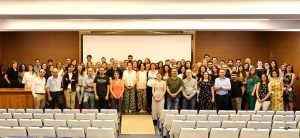
La primera reunión anual de la Red de Investigación Cooperativa Orientada a Resultados en la Salud RICORS-ICTUS se celebró los días 7 y 8 de junio de 2022 en el Salón de Actos Materno-Infantil del Hospital Universitario Doce de Octubre de Madrid con la asistencia de 122 miembros de la Red.



Los diferentes grupos de investigación que forman RICORS-ICTUS presentaron su equipo, líneas de investigación y lo que pueden ofrecer a la Red.
Líneas de investigación:
Línea 2. Tratamiento Fase Aguda
Línea 4. Reparación Cerebral y Recuperación Funcional
Línea 5. Prevención Secundaria
Grupos que forman la Red:
RD21/0006/0001- INSTITUTO DE INVESTIGACIÓN BIOMÉDICA HOSPITAL 12 DE OCTUBRE (IMAS12)
RD21/0006/0002 – COMPLEJO HOSPITALARIO UNIVERSITARIO DE ALBACETE
RD21/0006/0003-INSTITUTO DE INVESTIGACION SANITARIA DE SANTIAGO DE COMPOSTELA (IDIS)
RD21-0006-0004 -INSTITUTO DE INVESTIGACIÓN SANITARIA ILLES BALEARS (IdISBa)
RD21-0006-0005 – INSTITUTO DE INVESTIGACIÓN BIOMÉDICA DE SALAMANCA (IBSAL)
RD21-0006-0007 – INSTITUT DE RECERCA HOSPITAL VALL D´HEBRON
RD21-0006-0008-INSTITUTO DE INVESTIGACIÓN SANITARIA NAVARRA
RD21-0006-0009 – HOSPITAL UNIVERSITARIO LA PRINCESA
RD21-0006-0011 – INSTITUT DE RECERCA BIOMÈDICA DE GIRONA DR. JOSEP TRUETA (IDIBGI)
RD21-0006-0012 – INSTITUTO DE INVESTIGACIÓN HOSPITAL UNIVERSITARIO LA PAZ
RD21-0006-0013 – FUNDACIÓ CLINIC PER LA RECERCA BIOMÉDICA DEL HOSPITAL CLINIC DE BARCELONA – FCRB
RD21-0006-0014 – INSTITUTO DE INVESTIGACIÓN SANITARIA LA FE
RD21-0006-0015 – INSTITUTO DE BIOMEDICINA DE SEVILLA (IBIS)
RD21-0006-0017 – INSTITUTO DE INVESTIGACIÓN BIOMÉDICA DE A CORUÑA
RD21-0006-0020 – HOSPITAL CLÍNICO UNIVERSITARIO DE VALLADOLID
RD21-0006-0021 – IMIM-INSTITUT HOSPITAL DEL MAR D´INVESTIGACIÓ MÉDICA
RD21-0006-0022 – HOSPITAL UNIVERSITARIO CENTRAL DE ASTURIAS (HUCA)
RD21-0006-0024 – INSTITUT DE RECERCA EN CIENCIES DE LA SALUT GERMANS TRIAS I PUJOL
GRUPO CLÍNICO ASOCIADO – HOSPITAL CLÍNICO UNIVERSITARIO VIRGEN DE LA ARRIXACA
GRUPO CLÍNICO ASOCIADO – HOSPITAL UNIVERSITARIO MARQUÉS DE VALDECILLA
GRUPO CLÍNICO ASOCIADO – HOSPITAL UNIVERSITARIO PUERTA DE HIERRO
GRUPO CLÍNICO ASOCIADO – HOSPITAL SAN PEDRO DE LA RIOJA
GRUPO CLÍNICO ASOCIADO – HOSPITAL UNIVERSITARIO MIGUEL SERVET


